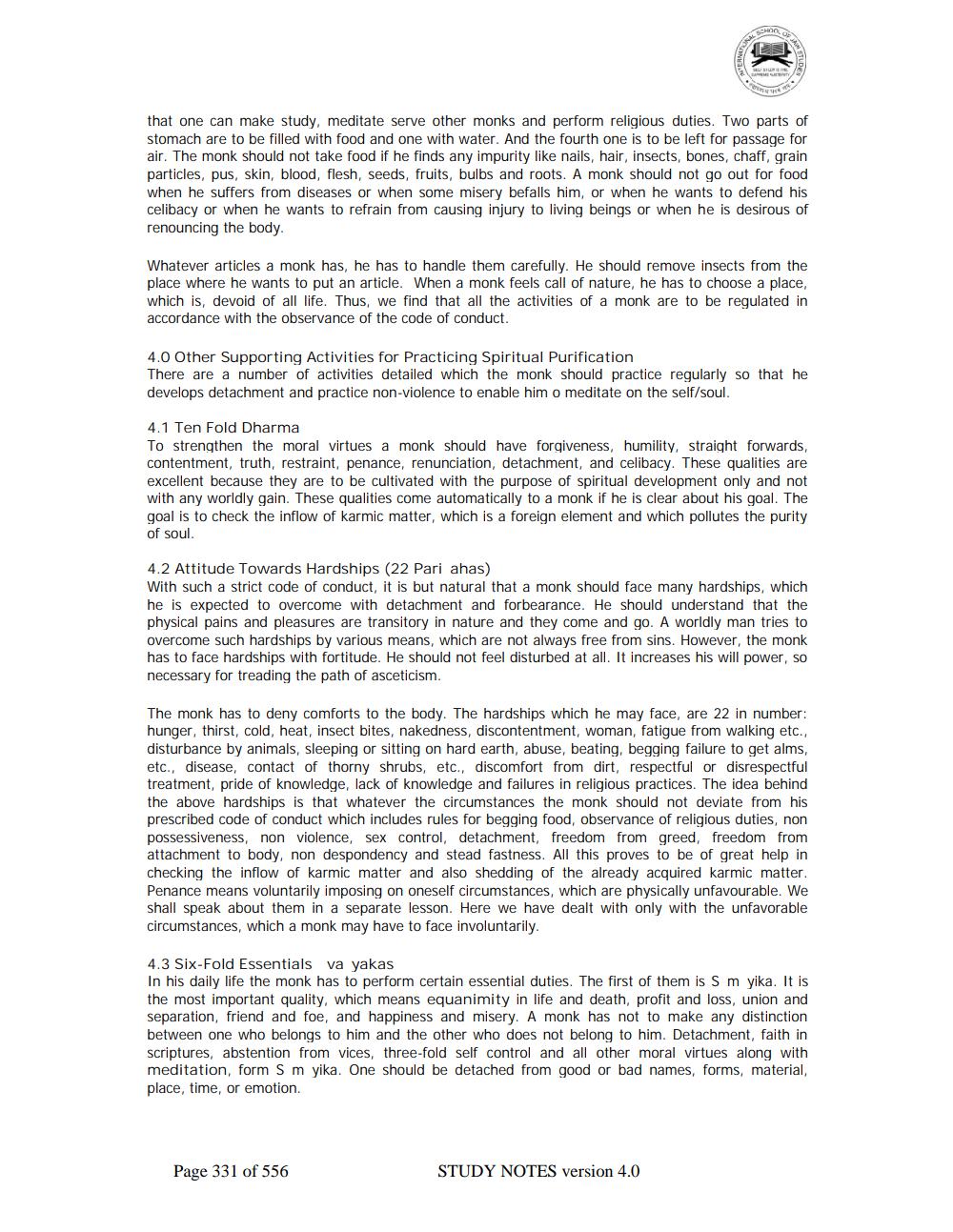________________
that one can make study, meditate serve other monks and perform religious duties. Two parts of stomach are to be filled with food and one with water. And the fourth one is to be left for passage for air. The monk should not take food if he finds any impurity like nails, hair, insects, bones, chaff, grain particles, pus, skin, blood, flesh, seeds, fruits, bulbs and roots. A monk should not go out for food when he suffers from diseases or when some misery befalls him, or when he wants to defend his celibacy or when he wants to refrain from causing injury to living beings or when he is desirous of renouncing the body.
Whatever articles a monk has, he has to handle them carefully. He should remove insects from the place where he wants to put an article. When a monk feels call of nature, he has to choose a place, which is, devoid of all life. Thus, we find that all the activities of a monk are to be regulated in accordance with the observance of the code of conduct.
4.0 Other Supporting Activities for practicing Spiritual Purification There are a number of activities detailed which the monk should practice regularly so that he develops detachment and practice non-violence to enable him o meditate on the self/soul.
4.1 Ten Fold Dharma To strengthen the moral virtues a monk should have forgiveness, humility, straight forwards, contentment, truth, restraint, penance, renunciation, detachment, and celibacy. These qualities are excellent because they are to be cultivated with the purpose of spiritual development only and not with any worldly gain. These qualities come automatically to a monk if he is clear about his goal. The goal is to check the inflow of karmic matter, which is a foreign element and which pollutes the purity of soul.
4.2 Attitude Towards Hardships (22 Pari ahas) With such a strict code of conduct, it is but natural that a monk should face many hardships, which he is expected to overcome with detachment and forbearance. He should understand that the physical pains and pleasures are transitory in nature and they come and go. A worldly man tries to overcome such hardships by various means, which are not always free from sins. However, the monk has to face hardships with fortitude. He should not feel disturbed at all. It increases his will power, so necessary for treading the path of asceticism.
The monk has to deny comforts to the body. The hardships which he may face, are 22 in number: hunger, thirst, cold, heat, insect bites, nakedness, discontentment, woman, fatigue from walking etc. disturbance by animals, sleeping or sitting on hard earth, abuse, beating, begging failure to get alms, etc., disease, contact of thorny shrubs, etc., discomfort from dirt, respectful or disrespectful treatment, pride of knowledge, lack of knowledge and failures in religious practices. The idea behind the above hardships is that whatever the circumstances the monk should not deviate from his prescribed code of conduct which includes rules for begging food, observance of religious duties, non possessiveness, non violence, sex control, detachment, freedom from greed, freedom from attachment to body, non despondency and stead fastness. All this proves to be of great help in checking the inflow of karmic matter and also shedding of the already acquired karmic matter. Penance means voluntarily imposing on oneself circumstances, which are physically unfavourable. We shall speak about them in a separate lesson. Here we have dealt with only with the unfavorable circumstances, which a monk may have to face involuntarily.
4.3 Six-Fold Essentials va yakas In his daily life the monk has to perform certain essential duties. The first of them is S m yika. It is the most important quality, which means equanimity in life and death, profit and loss, union and separation, friend and foe, and happiness and misery. A monk has not to make any distinction between one who belongs to him and the other who does not belong to him. Detachment, faith in scriptures, abstention from vices, three-fold self control and all other moral virtues along with meditation, form Sm yika. One should be detached from good or bad names, forms, material, place, time, or emotion.
Page 331 of 556
STUDY NOTES version 4.0




